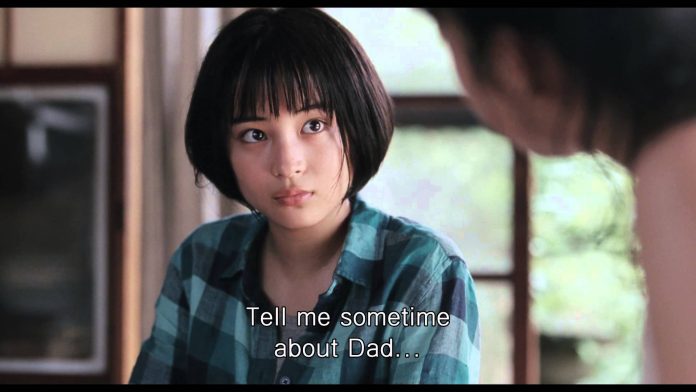HIROKAZU Koreeda has a deserved reputation for being one of the most reliable directors working in cinema of the Far East thanks to his family dramas, and his latest feature, a lovely work from Japan called Our Little Sister testifies to that.
The film begins with three working sisters, nurse Sashi (Haruka Ayase), bank assistant Yoshino (Masami Nagasaka) and retail assistant Chika (Kaho) arriving at the funeral of their estranged father. In spite of the bereavement, none seem to hold a sense of devastation due to the fact that there was never really a relationship with him.
It is during the service that they encounter 14-year old Suzu (Suzu Asano) who it is revealed is the daughter of their father, making her their half-sister. As they prepare to leave the area to return home, they invite their newly-discovered relative to come and live with them in their house in Kamakura given to them by their grandmother, which she accepts.
With the four now living together, the film follows their lifestyles privately and professionally, ranging from Sazu’s integration in her new school to Sashi’s relationship with a man who refuses to leave his wife.
Koreeda has made a name for himself with beautifully expressed and entertaining works like Still Walking and Like Father, Like Son. Now while the end results don’t place itself in the same breath as those works, this still plays as an impressive and genuinely heart-warming examination of familial relationships.
Koreeda’s usage of crafting works where children form the centre of the action is a common trait in not just the aforementioned works but others like Nobody Knows and I Wish. With Suzu, he contributes a memorable performance, as typical with his direction of child actors, for the actress but also expresses the innocence and intrigue of children to a sublime level.
One scene which depicts this is when upon agreeing to move in with her half-sisters, right after the doors on their train back home from the funeral close, she runs after the train in a beautiful scene which tells us that this is the beginning of their adventure.
Her integration at school demonstrates the placement of her school as what it should be, a happy-go-lucky area where friends are made and the act of socializing as though years have passed is clear to see. In fact, Koreeda deserves credit for creating the illusion of school as some form of utopia given the positivity that is displayed in those sequences.
The ways in which Koreeda balances the lifestyles of the characters is especially key to maintain the integrity of the film. Sashi has her life entangled when the relationship she has with a married man is further complicated when he proposes that they move to America due to the work there that will benefit his career as a doctor. Scenes showing Yoshino in her job as a bank assistant also help to display a carefully constructed mix of professional life alternating with private.
Another storyline in the film details the close bond that is developed between the elderly woman who owns a café frequented by the characters. The closeness of the relationship makes for enjoying the company provided and that the range of characters prove just as likable as the main quartet of actors, all of whom contribute to the film’s success. It all but makes for an engaging segment later when it is revealed that she is dying and her resigned attitude makes us as viewers feel desperately sorry for all involved, especially as there is such warmth within their relationships.
There is enjoyment that comes out of viewing scenes where the four sisters are shown socializing in their house, with the presentation of the sisters getting used to their new company and not falling into overt use of cliché. They move in, do not face obstacles and her presence does not appear to be a problem for them at all, placing the original method of just focusing on the positives of the relationships.
The level of light-hearted nature is a welcome trait, such as scenes where a male friend proceeds to tease the girls with his foot which is missing some of its toes, or one of the sisters reacting to a spider in the shower.
Watching the characters, whether in a social gathering at the local café, or at home together, or the concluding scenes on a beach, is such a welcome area because of their generosity and likability. It only continues the belief that there is no such thing as an unlikable character in a Koreeda film, let alone in this.
Our Little Sister represents typical Koreeda, depicting a situation that rests on how interesting and welcoming the characters are, of which they are presented as such, in another enjoyable work from an often world-class director.






























